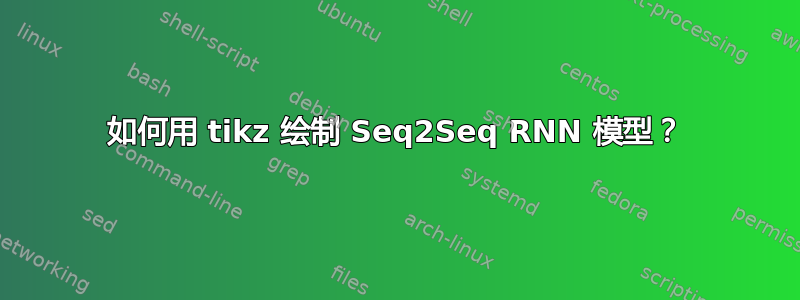
我想绘制这个 RNN 编码器-解码器模型,使用此处的 tikz:
https://github.com/harvardnlp/seq2seq-talk/blob/master/slidescmu.pdf
这是一张不错的图表,但不幸的是我不知道如何开始设计它。有人能帮我开始吗?提前谢谢了。
答案1
这是你发布的图表的一个不太完整的复制品,灵感来自seq2seq-talk 存储库中的代码:
\documentclass{standalone}
\usepackage{tikz}
\usetikzlibrary{shapes}
\usetikzlibrary{arrows}
\usetikzlibrary{positioning}
\begin{document}
\begin{tikzpicture}[
hid/.style 2 args={
rectangle split,
rectangle split horizontal,
draw=#2,
rectangle split parts=#1,
fill=#2!20,
outer sep=1mm}]
% draw input nodes
\foreach \i [count=\step from 1] in {the,blue,house,{{$<$eos$>$}}}
\node (i\step) at (2*\step, -2) {\i};
% draw output nodes
\foreach \t [count=\step from 4] in {la,casa,azul,{{$<$eos$>$}}} {
\node[align=center] (o\step) at (2*\step, +2.75) {\t};
}
% draw embedding and hidden layers for text input
\foreach \step in {1,...,3} {
\node[hid={3}{red}] (h\step) at (2*\step, 0) {};
\node[hid={3}{red}] (e\step) at (2*\step, -1) {};
\draw[->] (i\step.north) -> (e\step.south);
\draw[->] (e\step.north) -> (h\step.south);
}
% draw embedding and hidden layers for label input
\foreach \step in {4,...,7} {
\node[hid={3}{yellow}] (s\step) at (2*\step, 1.25) {};
\node[hid={3}{blue}] (h\step) at (2*\step, 0) {};
\node[hid={3}{blue}] (e\step) at (2*\step, -1) {};
\draw[->] (e\step.north) -> (h\step.south);
\draw[->] (h\step.north) -> (s\step.south);
\draw[->] (s\step.north) -> (o\step.south);
}
% edge case: draw edge for special input token
\draw[->] (i4.north) -> (e4.south);
% draw recurrent links
\foreach \step in {1,...,6} {
\pgfmathtruncatemacro{\next}{add(\step,1)}
\draw[->] (h\step.east) -> (h\next.west);
}
% draw predicted-labels-as-inputs links
\foreach \step in {4,...,6} {
\pgfmathtruncatemacro{\next}{add(\step,1)}
\path (o\step.north) edge[->,out=45,in=225] (e\next.south);
}
\end{tikzpicture}
\end{document}



